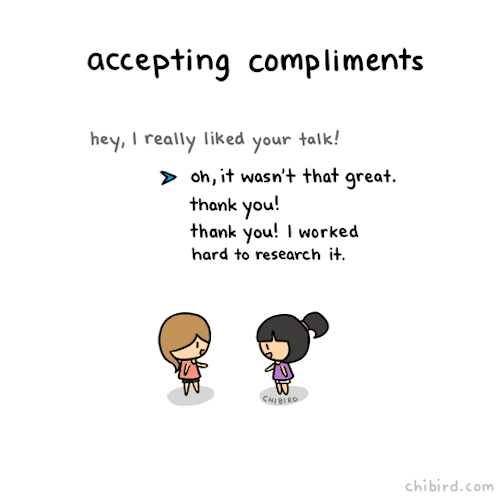At the start of my career, my thinking was way too black-and-white.
Someone would tell me, “Be less polite with your emails”, and I’d translate that to “the blunter the email the better.” Then I’d get grumpy replies from seniors and wonder what I was doing wrong.
Really, I could’ve used Aristotle’s advice:
That virtue is found in the ‘golden mean’ between two opposing vices - a lack, and an excess.
Courage, for example, is the sweet spot between cowardice (too little) and recklessness (too much).
And this principle applies to so many aspects of our careers, including confidence - something a lot of us struggle with.
We often find ourselves either being a doormat (lack of confidence) or thinking we're The Chosen One (excess) to the point that co-workers can’t stand us.
In between, there’s a level of confidence that’s universally respected and admired, and makes the world of work a whole lot easier.

So, today, I’m gonna break down a few habits, and show you how to navigate this tricky middle path.
😞 Apologies
Doormat: You spilled my drink? Oh my gosh, I’m so sorry!
Arrogant: Apologize? What’s an apology?
Confident: Apologizes sincerely when something’s their fault. Or replace sorry with thank you: i.e. "Thanks for your patience" instead of “Sorry I couldn’t get back to you sooner.”
If you’re saying sorry all the time, for every little thing, stop. It undermines your authority and makes you appear less confident.

Likewise, if you never hold your hand up and say “my bad”, your team’s morale won’t last long.
Quick fix: For one week, catch yourself before saying "sorry." Ask: "Is this actually my fault?" If not, rephrase. "Sorry I'm late" becomes "Thanks for waiting." "Sorry to bother you" becomes "Do you have a moment?"
=> Get into the habit of only saying sorry when you mean it. Think sometimes, not all the time.
🧩 Contributing ideas
We’ve all been in a brainstorming session with people who love the sound of their own voice. Unfortunately, these people have some of the worst ideas.
Doormat: Nobody would like my idea.
Arrogant: It’s my way or the highway.
Confident: I think X would work, but let’s hear what everyone else thinks.
If you’re quiet, make a real effort to contribute to meetings. Preface with: "I have a thought" or "Can I add something?"
If you don’t have anything good, ask questions instead to move the discussion forward.
Try this: Before your next meeting, prepare one point you want to make. Write it down. When there's a natural opening, use a confident lead-in: "One thing we might consider is..." Even if it's not perfect, you've broken the silence barrier.
👏 Receiving compliments
Doormat: You like it? Well it was no big deal.
Arrogant: My work’s amazing, I know.
Confident: Thanks! Appreciate it!
It’s amazing the number of people who just can’t take a compliment (me included). If you instinctively brush them off (you say something like “It was nothing...” or “It could be better...”), let a compliment land for once. Thank the other person, and tell them you appreciate it.
It might sound weird, but it’ll make the other person feel good too.

A lot of us often dismiss compliments we receive as a reflex action. But that makes light of our work, and makes it seem like we didn't put as much effort in as we could have.
More practically: When someone says "Your presentation was excellent," try responding with: "Thanks! That slide with the fun graphs took forever to put together — I’m glad it came across well".
🤷♂️ Saying "I don't know"
Nothing undermines credibility faster than pretending to know something you don't. Yet many of us would rather fake knowledge than admit uncertainty.
Doormat: "I have no idea... sorry!" (with a nervous laugh and downcast eyes)
Arrogant: Makes up an answer or deflects with "Well actually..." to avoid admitting ignorance.
Confident: “I’m not 100% sure and I don’t want to give you incorrect information. Would it be OK if I get back to you in an email?”
True confidence is being secure enough to acknowledge gaps in your knowledge while showing you have the competence to fill them. Other situations:
- In a meeting: “I don’t have the info right now but I’ll make a note and follow up with some meeting notes on that point.” If you come back by sending all parties involved a detailed answer in an email, it’ll look far more impressive than trying to blag it in the meeting.
- For managers: When a team member asks something you don't know, try: "What's your take on it?" This turns the moment into a coaching opportunity rather than exposing a knowledge gap.

🎯 Being more direct when asking for help
Doormat: “I know how busy you are, but...”, “I hate to bother you...”, or "It would be great if you could..."
Arrogant: Where’s the spreadsheet? I shouldn’t have to ask you for it.
Confident: "Can you update the spreadsheet please?"
When you're asking someone for a favor, it's easy to be overly polite and apologetic. Instead, be direct with your asks and don't assume you're creating a burden on someone.
It's a sign of confidence to not beat around the bush.
A simple framework: Next time you need something from a colleague, try this formula: State what you need + when you need it + why it matters:
- "Could you send me the Q3 numbers by Thursday? I need them for the client presentation on Friday."

🗣️ Speaking with authority
The language patterns you use signal your confidence level to others. Filler words, excessive qualifiers, and rushed speech all undermine how you're perceived.
Doormat: Uses qualifiers constantly: "I think maybe we could possibly consider..."
Arrogant: Steamrolls everyone, interrupts, and speaks with unwarranted certainty
Confident: Removes unnecessary qualifiers, speaks clearly, and uses pauses effectively
The quickest ‘hack’ I can give you for this — and one that has worked for me — is to intentionally speak slower and use pauses. When you speak slower, your brain will have the time to organize your sentences — you’ll end up not using fillers.
🧩 Embracing vulnerability
Doormat: I'm an impostor. If they find out, I'm toast.
Arrogant: Flaws? I don't have flaws. I'm practically perfect.
Confident: Everyone’s got impostor syndrome (including my boss). Admitting weaknesses shows strength and builds trust. We're all human.
The most confident people readily own up to mistakes and knowledge gaps.

🤦♂️ Self-criticism
If you’re too self-critical, you’re holding yourself back.
Doormat: I can’t do anything right.
Arrogant: The sun shines out of my rear end.
Confident: There’s things I’m not great at, but everyone’s a work in progress. No need to beat myself up over it.
Your mind should be a coach, not your enemy. Train yourself to see your wins by keeping a “brag folder” or gratitude journal (also helps with impostor syndrome too — personally, I save the nice replies in a separate folder in my email, and look at them whenever I feel like I’m not doing good enough).
P.S. Read my essay The career advice that finally silenced my inner doubter. It was super positively received.

🤼 Handling disagreement
Doormat: "You're probably right" (even when they think otherwise).
Arrogant: Becomes defensive, takes disagreement as personal attack, must "win" every argument.
Confident: Can express a different opinion without making it personal, and can be wrong without feeling diminished.
The ability to engage in healthy conflict is one of the most valuable professional skills you can develop. It requires separating ideas from identity.
Disagreement script: "I can see why you'd come to that conclusion, some additional context: (and then state why you came to a different conclusion)."
This approach is miles away from a blunt "I disagree." It values their thought process, providing a sense of shared understanding.
You can also end with a question: "What am I missing from your perspective?" This keeps the door open for dialogue rather than debate.

🙅 Saying no
Doormat: Work at the weekend for no pay? Ummm, I guess. (lose-win)
Arrogant: Who cares if the other party loses? (win-lose)
Confident: I can’t agree to anything that’s going to be high friction long-term. Let’s find something that works for everyone now rather than complain later. (win-win)
You have to learn to say ‘no’ at work — especially if you’re faced with unreasonable asks — to protect your time AND the quality of your work. Here’s a good way to say no to your boss.



